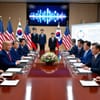The article reports that United States and South Korea have reached an agreement to deepen cooperation in key high-tech sectors, notably artificial intelligence (AI), quantum computing, and next-generation telecommunications (6G). The pact is seen as part of a broader push by the U.S. to solidify alliances and maintain technological leadership, particularly in competition with China.
Under the terms of the deal, Washington and Seoul will coordinate on export controls for advanced technologies, streamline regulations to ease cross-border data and model operations, and jointly invest in research and development of quantum computing platforms. The collaboration also encompasses biotechnology and supply chains, indicating that the alliance extends beyond just computing hardware into broader innovation ecosystems.
The strategic timing of the agreement is significant: it coincides with high-level meetings between the U.S. President and the South Korean leadership during the APEC Summit and comes amid unresolved trade discussions between the two countries, such as Seoul’s sizable investment pledge of $350 billion. The piece argues that while the tech deal signals strong intent, the practical implementation will hinge on how well both sides reconcile lingering trade and investment disputes.
In summary, this agreement marks a notable step toward closer U.S.—South Korea technological alignment and represents a strategic move in the global race for AI and quantum dominance. At the same time, it raises questions about how trade, regulation, and industry coordination will be managed in practice—a reminder that such high-level initiatives often encounter real-world frictions before their full potential is realised.


